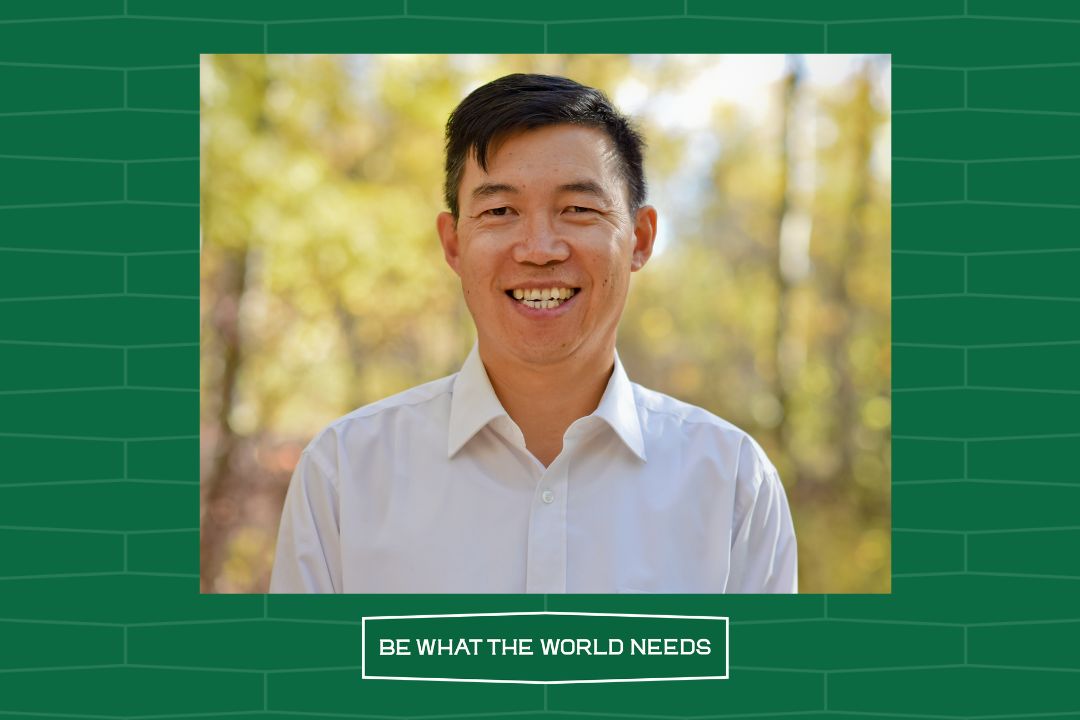
Sharing expertise, building connection important for Lifeng Zhang
During Asian Heritage Month, USask Engineering celebrates the journey of researcher and award-winning professor Lifeng Zhang
By Donella HoffmanGrowing up in a small village in rural China, Lifeng Zhang saw the impact that technology could make on everyday life.
“In the whole village there was only one black-and-white TV with very limited channels. So for the big events, almost the whole village went to that one home to watch TV,” Zhang recalled recently from his office in the University of Saskatchewan (USask) College of Engineering.
A weekly drama produced in Hong Kong was a big draw for the 500 or so villagers, but they could watch only if there was power available that evening in their remote countryside. “People would just wait to see. ‘Oh, there’s the light, okay let’s go!’ It was a very unique experience, very fun.”
With time, more modern amenities were available in the village – beyond the one TV and intermittent power – and the advances influenced Zhang’s career choice.
“Obviously, it was because of technology, because with engineering we can build things and make things better. I started to think I could become an engineer too, to make some contributions, to change the world.”
At 18 he was one of 200,000 students in his province who wrote the high-stakes tests that determined what he would study in university and where. Decisions were based on the scores students achieved. The more desirable the program, the higher the grade needed.
“It’s very, very competitive,” said Zhang. “You prepare for the exam but if things don’t go your way you might end of up in a completely different university and completely different program (than you wanted). I was lucky and I met the line.”

Zhang attended Zhejiang University, a public university ranked third in China and 44th in the world in the 2024 QS rankings. There he earned his Bachelor of Engineering and his Master of Science.
During this time, he began to consider a career that would take him beyond China.
“When I was little, my dream was to go to a big city and live in a high-rise building,” he said, smiling. “But obviously, when you get to university, you learn more and you have a sense that outside of China there is a lot of things you can explore.”
Ultimately, he chose to study in Canada and earned his PhD in chemical engineering at the University of Waterloo, followed by post-doctoral work at the University of British Columbia.
He then spent three years as a project engineer at an R & D firm before joining the faculty of the Department of Chemical and Biological Engineering at USask in 2013, becoming a full professor in 2023.
At the USask his research has transitioned to focusing on particles: bubbles and droplets, with applications to energy and sustainable processing for agriculture and food, and the potash industry as well. A specific example is seeking novel engineering solutions to process plant-based proteins using less energy or less water, to lessen the environmental footprint.
Outside the lab, Zhang is a dedicated teacher of both graduate and undergraduate students.
“We have a few responsibilities here as an engineer, especially in the academic setting. Obviously, there’s research, providing an engineering solution for different challenges. More importantly for us, we're also training grad students. You pass along your experience and your expertise to the future generation on the research side.”
Zhang is also committed to the success of his undergraduate students. This was recognized with a 2023 Provost’s College Award for Outstanding Teaching. Core courses he’s taught include Fluid Mechanics, Process Engineering and Design and Capstone Design class.
“He clearly enjoys teaching and takes an interest in every one of his students and continually comes up with way to make a fairly dry class become a fun, enjoyable lecture. . . . He genuinely wants his students to succeed,” wrote one undergrad in a recent evaluation.
Zhang is very aware that students are facing challenges outside the classroom – whether it’s their overall workload, getting sick, or struggling to grasp difficult material – so he makes an effort to reach out individually to them, to show an interest in them beyond the schoolwork.
“Teaching students and conveying your knowledge, your experience, requires a lot of effort, not just simply going and presenting things in the classroom. It's much more than that. For myself, I want to connect with them, to show the best of myself as a teacher.
“When you deal with a real person and you feel connected with an undergrad student, you feel alive. Yes that is definitely the feeling.”

